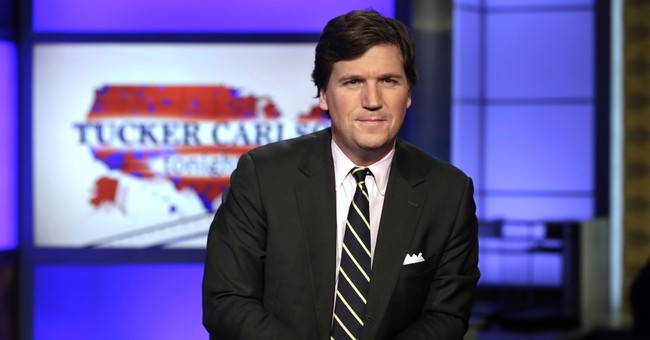
Source: AP Photo/Richard Drew
Fox News’ Tucker Carlson thinks business people are destroying America. He sees the evidence everywhere:
If you’ve spent any time driving around America recently, you may have noticed that an awful lot of the country seems to have shriveled up and died. Take a trip on route two in Maine some time and count the boarded-up paper mills and abandoned houses. Or head down route 23 in Michigan or Ohio and consider the empty factories ringed with barbed wire. Outside the coastal cities, scenes like this are everywhere. Shuttered car dealerships, next to defunct restaurants, across the street from thrift stores and methadone clinics. Community after community, desiccated. Empty husks, with nothing left. Huge swaths of the United States look like this now. What happened?Reasonable people investigate a problem instead of taking the lazy way out and rounding up the usual suspects. Economics is one of the most popular majors on college campuses because some people want to know why things happen. Others, like Carlson, assume their personal experiences have given them all the knowledge they need to understand economic problems. Students like him give economics teachers the hives. They counter every principle they meet in class with a personal experience, not realizing that we read books or take classes to learn from people who have devoted carriers to studying the personal experiences of others. Statistics, after all, is the cataloging and analysis of the personal experiences of millions. Economists take those statistics and discover general principles of behavior.
Had Carlson taken an intro to economics class, he would know that what he laments as destruction is progress. The economist Joseph Schumpeter became famous for calling it “creative destruction.” Carlson praised John D. Rockefeller, Henry Ford, and Andrew Carnegie for building America. But Rockefeller destroyed the whale oil industry and devastated the communities of those who depended on it for a living. Carnegie ruthlessly ravaged workers who depended on iron and wood for building materials as well as the many small steel makers he put out of business. And Ford caused havoc among the millions who raised horses, made buggies and buggy whips.
Had Carlson spent a little effort in investigating why many rural towns have died, he would discover that the main villains have been mechanization in agriculture and Eisenhower’s interstate highway system. In the 1960s the head of the Department of Agriculture toured rural America and warned the leaders of small towns that increased mechanization in agriculture would reduce the number of hands needed to work farms and ranches and depopulate their towns as those workers moved to the cities. He described a process that had begun centuries before but had accelerated. With “ruthless efficiency,” Carlson’s phrase, farmers increased their output and reduced the prices of food for everyone, including those countries they would export food to. We are richer and fatter today because of them.
But Carlson isn’t concerned about farm jobs. Why not? Has he never read fellow socialist Wendell Berry? Carlson laments the loss of manufacturing jobs. Besides the process of creative destruction, he needs to examine government policies such as a minimum wage, high taxes, massive regulations, unions, and monetary policies that have emaciated manufacturing in the country.
President Eisenhower’s interstate highway system made travel by car much nicer, but it wrecked travel by rail and crushed the workers in that industry. And it motivated politicians in every state to build four lane highways as a means of economic development. But those new highways put retailers in small towns in direct competition with bigger stores in cities. As a result, rural towns turned into ghost towns on weekends as the residents drove to cities to shop and eat. Sam Walton kept some of those shoppers in small towns.
Instead of those, Carlson lynches a hedge fund manager, Paul Singer, labeling him part of “vulture capitalism.” I won’t defend Singer because I don’t know much about him or his business practices. But Carlson should keep in mind that God created the real-life flying vultures that he uses to insult Singer. Why? They perform the very important service of getting rid of dead animals so that the carcasses don’t spread disease.
In the economy, “vultures” have a similar purpose as part of Schumpeter’s creative destruction. Valuable resources that could be put to better use to improve the lives of everyone are tied up in failing, diseased and half-dead companies. Vulture and predator capitalists kill diseased companies and free up their capital for investment in parts of the economy that suffer from a lack of investment, thereby creating more jobs than they had euthanized.
Sydney, NE had a population of 6,757 and lost 2,000 jobs when Bass Pro closed the distribution center in it. Bass Pro executives believed the Sydney center was a waste of resources that they could employ in more important areas to create more jobs. Individually, the Paul Singers of the world may be immoral, or they may be saints, but they are as vital to a healthy economy as the real vultures are to nature.
Boil down Carlson’s complaint and all that we can find is a fear of change. Change of any kind always hurts someone. Carlson hates change. But the lack of change leaves poor people with no hope for the future. Had the Dutch suffered from Carlson’s complaint and refused to instantiate capitalism three centuries ago, we would still be dying from regular Malthusian cycles of famine and mass starvation.
Originally published at Townhall Finance.
No comments:
Post a Comment